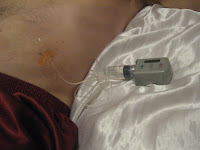
A few months ago, I was approached by Parkinson's Victoria, wanting to know if I would be willing to be interviewed for an article, describing life as a carer for someone who has had PD for 25 years. The article is to be used as part of Parkinson's Victoria's Christmas Appeal, 2011. This morning, without notice, I received the actual copy, sent to all Parkinson's Victoria members. It was a slight shock, to see your words on such a personal matter in print.
I was interviewed by a wonderful lady named Indira Kennedy. A half hour interview turned into a two hour chat. I described the problems we have faced, warts and all, and she came up with a wonderfully sensitive take on the difficulties we face on a daily basis. I have added some details to round out the story in italicized type.
Here is how she worked a terrible tale into a blessed life:
Counting Our Blessings
My husband Paul has
lived with this challenging illness for over 25 years. He was only 30 years old
when he was diagnosed, but probably had developed the disease a few years prior to diagnosis. It was so early in life and such early days in
understanding how to manage it and live well with an ‘older person’s disease’.
I met Paul as a father
of two girls. I have three boys. My own health is challenging, having a mental illness and rheumatoid arthritis as well as back problems, and sometimes I
wonder who is looking after whom! Between us, as a second marriage for both,
you could say we had a lot on our plate.
At first Parkinson’s
wasn’t so noticeable. Paul had a lot of coping skills and hid the symptoms well.
As a scientist he knows everything there is to know about the physiology of disease. Paul was a senior research scientist at CSIRO for 22 years, specializing in Molecular Biology. He also won many awards including the prestigious "Chairman's Medal". He loves history and immersed himself in the thousands of books lining our
home; Seriously!. He has an amazing sense of humour and a wonderful way with language. But
at an emotional level, it’s another thing altogether.
You could say Paul
doesn’t want to know, to face up to what has gradually taken so much of him. But
what I have learned is that Paul hates confrontations, always looks for peace
and doesn’t allow his condition to rob him of his good nature.
 |
| At Cross Country, Benalla |
For example, Paul was
fabulous with the children when they were young. He took them to Little
Athletics every Saturday during summer, and cross country during winter, despite his condition. When he could no longer drive,
he took a taxi. He quietly soldiered on.
As for me, I have
learned to express the emotion for both of us. I know what it is to go through
the stages of grief, having lost both my parents around the same time Paul's health began to worsen, to feel robbed of the spritely man I married, to have our
children struggle to confront the reality of a dad who was ill.
Many times I have
fallen into total exasperation, burdened by the dependency on me. At times it was like looking after my father in the last months of his life - Paul had become an "old man". Sometimes it
feels like I’m flying blind dealing with how Paul is feeling or what he needs
to be comfortable. I’ve come home to find him frozen in muscle spasms on the
floor, or in the full throes of tremors. I had to give up work, in 2008 just as he did, aged 49 two years previously, to try to live better with the progression of this demanding disease.
My saving grace was
contacting Parkinson’s Victoria
But more importantly,
I learned what side effects to expect from the many drugs Paul needed to control his
spasms, to know what stages to expect as the disease took its path, got referrals
to other services, and I learnt what our options were. One of those options was a change in his drug regime which included a 24 hour infusion pump of the dopamine agonist of Apomine, changed daily, until there was nowhere to put the butterfly needle as he was so skinny, and finally, Deep Brain Stimulation in May of 2010. Note: The solutions that suited Paul are not for everyone. Please talk to your neurologist!
 |
| Infusion pump and needle |
 |
| Charging across a Southern US battle field |
We travelled to America
These days Paul
snoozes a lot during the day, and seems slower. But his mind is just as sharp
and his love is just as powerful.
Thankfully, Parkinson’s
will not shorten Paul’s life - he can expect to live as long as any average
Australian male. But Parkinson’s will continue to challenge us, and sometimes
in unpleasant ways. We will still need Parkinson’s Victoria
There is no doubt
Parkinson’s has changed Paul a lot. I might not have the man I married, but I
do have the man who in his own way keeps on fighting alongside me, in the best
way he knows how. And we constantly count our blessings.
Everyone has their own
story, and their own journey. Parkinson’s Victoria
Please give generously
to this appeal. We know, as most likely you do, the incredible difference this
service makes to so many lives.
Thank you and please
have a safe and joyful festive season.
Linda

